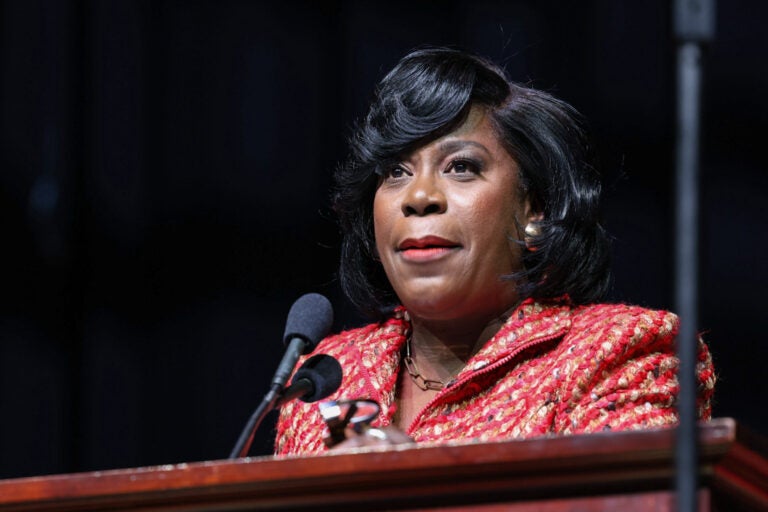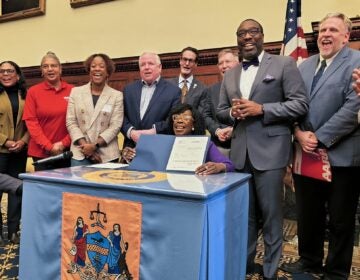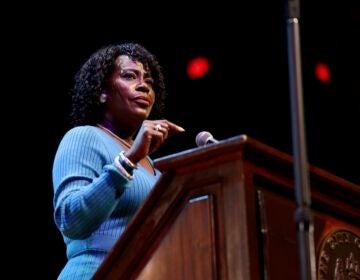Some GOP execs worry ‘Democratic business as usual’ under Mayor Parker; others are hopeful for change
For some business executives who lean Democrat, the Parker administration is the best case scenario. Others fear a mayoral “echo chamber.”
Listen 1:58
Philadelphia Mayor Cherelle Parker addresses the public for the first time after being sworn into office on Jan. 2, 2024. (Kimberly Paynter/WHYY)
From Philly and the Pa. suburbs to South Jersey and Delaware, what would you like WHYY News to cover? Let us know!
One day after Mayor Cherelle Parker’s historic inauguration, a celebratory digital billboard display scrolls across the top floor of a historic building on Market Street in Center City.
While dozens of business leaders were pulled in close during the transition period and tapped to serve on her advisory committees, not everyone celebrated Jan. 2 with the same fanfare.
Ben Mannes, a public safety and risk consultant for Mannes & Associates, said he’s worried Philadelphia’s 100th mayor has surrounded herself with insiders, shutting out any differing perspectives.
“Philadelphia is famous for echo chambers,” Mannes said. “It’s a closed shop. All boards and advisory panels.”
Mannes said he’s willing to give Parker a chance to succeed, but is concerned she won’t focus on the basics of government or economic competitiveness, such as bringing more business to the ports, industrial sites, and the city’s core.
“I’m cautiously optimistic but looking very cautiously at how Mayor Parker will govern the city in a different manner so that we could break out of the business as usual,” he said. “You have to provide a safe environment for your employees and for your business. If you have the highest personal and business tax burden in the region you can’t keep spending money for results you’re not getting.”
Parker has previously promised that her goal is to broaden the existing tax base, to move more residents off government assistance programs, and to improve the environment for small businesses.
Meanwhile, Philly’s Center City commuter wage tax base is shrinking. More than $94 million was refunded to employees of companies working remotely in the suburbs in 2021. Another $85 million was refunded to those workers from city wage taxes in 2022.
Mannes, the security consultant, said he’s not impressed with the diversity of Parker’s administration. He would prefer diversity of thought, he said.
“Mayor Parker’s biggest concern [should be] giving employers and residents more bang for their buck,” he said. “You could make people feel great on their niche social issues all you want. But at the end of the day people have mortgages to pay, rent to pay, payrolls to cut.”
He noted there has been much more business activity in the surrounding suburbs, as in Conshohocken, King of Prussia, and South Jersey, where more corporate headquarters are located.
“In some cases, you’ll pay more for the privilege of having that premium like in New York or North Jersey where you have great port access, great infrastructure. But when you’re in Philly, you’re not getting those services,” he said. “When you don’t provide for the basics [in Philadelphia], companies will vote with their feet.”
Now Parker is responsible to spur economic development opportunities for all city residents — not just Philadelphians who voted her into office or constituents within a specific City Council district.
On Tuesday, the mayor declared that the city is “open for business,” aiming to spur economic opportunity during her first 100 days in office.
Leading that charge will be Alba Martinez, the first openly LGBTQ person to serve in that role and a Latina. Martinez is the former CEO of the United Way of Southeastern Pennsylvania and has worked as an executive for Malvern-based Vanguard. She has worked in city government previously as Philadelphia’s commissioner of human services during Mayor John F. Street’s administration.
For local Republican Michael Cibik, bankruptcy law attorney with Cibik & Cataldo, he’s also open to a moderate Democrat like Parker being in power.
“I think she’s a breath of fresh air of moderation,” Cibik said, comparing Parker to her predecessor, Mayor Jim Kenney, and progressive mayoral hopefuls like Helen Gym.
But he’s not banking on much to change under Parker’s tenure.
“They promise a lot of things. Many times they don’t accomplish that but let’s give her a chance,” he said. “Kenney had high aspirations when he came in. He’s an intelligent guy, but it just seemed like he died on us.”
Under Parker’s economic opportunity plan, she will require every city department to submit a suggested list of unnecessary permits and regulations that can be eliminated during her first 100 days.
That’s a page out of the political handbook of Pennsylvania Gov. Josh Shapiro, who focused his first year in office on streamlining government red tape.
Likewise, Parker announced she’s removing the job requirement for city workers to have college degrees “where it is unnecessary,” which Shapiro did for state workers in March 2023.
Parker’s plan is to create a team inside her administration focused on “minority business success,” with the intention of rustling up investors to support a diverse array of businesses. She also wants to convene a business roundtable to grow the local economy and to open neighborhood resource centers across the city.
Some argue Parker’s approach is similar to roadmaps under previous Democratic mayors, with an emphasis on social equity to boost the economy.
“It seems like the last several decades we’ve been spending more time on a lot of social issues. Perhaps we should focus on more simple things, jobs, education and family,” Cibik said. “If you get a good education, they can get a job. They’re going to stay out of trouble and they’re going to be able to provide for their family.”
Cibik said he would support Parker’s goals of year-round K-12 public education and bringing building trades and vocational careers back into the school district. Parker reminded her supporters of that during her inauguration speech, saying “we’re going to keep our schools open from 7:30 a.m. to 6 p.m. year-round.”
Cibik said he’s concerned about the weight of student debt in the city, particularly for graduates who are cobbling together jobs to repay student loans.
One of Cibik’s clients sought bankruptcy protection from student loans totaling $300,000 to ultimately teach middle school art after college.
“I’d like to see more accountability with the universities,” he said. “The ultimate purpose of college is to get a job. And if I can’t find a job but I went to a university they should give the money back.”

Get daily updates from WHYY News!
WHYY is your source for fact-based, in-depth journalism and information. As a nonprofit organization, we rely on financial support from readers like you. Please give today.






